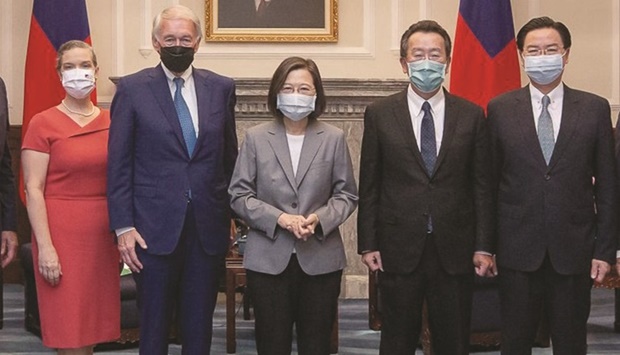China staged fresh military drills around Taiwan yesterday, slamming a new visit by US lawmakers to the island days after a similar trip by House Speaker Nancy Pelosi triggered a furious response from Beijing.
The unannounced two-day trip by senior members of Congress prompted China to renew its rhetoric that it would “prepare for war” over Taiwan, that Beijing’s leaders claim and have vowed to one day seize.
The five-member congressional delegation – led by senator Ed Markey of Massachusetts – met with President Tsai Ing-wen yesterday, according to Washington’s de facto embassy in Taipei.
“The delegation had an opportunity to exchange views with Taiwan counterparts on a wide range of issues of importance to both the US and Taiwan,” it said.
Tsai told the lawmakers she wants “to maintain a stable status quo across the Taiwan Strait” and “jointly maintain the prosperity and stability of the Indo-Pacific region”, her office said in a statement.
She said Russia’s invasion of Ukraine demonstrated “the threat that authoritarian states pose to the world order”, according to her office, and also thanked Washington for its support in the face of Chinese military threats.
The bipartisan trip sparked another bellicose response from Beijing, which said it had carried out a fresh round of “combat readiness patrol and combat drills in the sea and airspace around Taiwan island” yesterday
“The Chinese People’s Liberation Army continues to train and prepare for war, resolutely defend national sovereignty and territorial integrity, and resolutely crush any form of ‘Taiwan independence’ separatism and foreign interference attempts,” Wu Qian, a spokesman for China’s defence ministry, said.
“We warn the US and the DPP authorities: ‘Using Taiwan to contain China’ is doomed to failure,” he added, referring to Taiwan’s ruling Democratic Progressive Party.
In a defiant response, Taiwan’s defence ministry vowed to face the latest drills “calmly and seriously and defend national security”.
“Apart from expressing condemnation (of China’s drills), the ministry of national defence will comprehensively grasp the movements in the sea and airspace around the Taiwan Strait,” the ministry said.
It added that its forces had detected 30 Chinese planes and five ships operating around the strait yesterday.
Of those, 15 planes crossed the median line — an unofficial demarcation that Beijing does not recognise.
Yesterday’s drills followed days of huge exercises around Taiwan in the wake of Pelosi’s visit, which saw Beijing send warships, missiles and jets into the waters and skies near the island.
Taipei condemned those drills and missile tests as preparation for an invasion.
China’s Communist Party has never ruled Taiwan but says it will use force if necessary to take the island and bristles at any perceived treatment of it as a sovereign nation state.
That decades-old threat was reiterated in a white paper published last week, when China’s Taiwan Affairs Office said it would “not renounce the use of force” against its neighbour and reserved “the option of taking all necessary measures”.
Taipei has remained defiant throughout the standoff with Beijing, with Premier Su Tseng-chang saying the island welcomed “all countries and friends across the world” who want to support it.
“We shouldn’t be too afraid to do anything, afraid to let visitors come and afraid to let our friends come, just because we have an evil neighbour next door,” he said.
Foreign minister Joseph Wu struck a similar tone after meeting the US delegation yesterday.
“Authoritarian China can’t dictate how democratic Taiwan makes friends, wins support, stays resilient and shines like a beacon of freedom,” Wu said in a tweet.
Pelosi has stood by her visit which, combined with Beijing’s response, sent tensions in the Taiwan Strait soaring to their highest in decades.
President Joe Biden said the US military was opposed to the trip by his fellow Democrat, who is second in line to the presidency after the vice president.
Congress is constitutionally an equal branch of government in the US, with lawmakers free to travel where they wish, and Taiwan enjoys bipartisan backing in divided Washington.
The US switched diplomatic relations from Taipei to Beijing in 1979.
But it remains a key ally of Taiwan and maintains de facto diplomatic relations with Taipei.

Taiwan President Tsai Ing-wen (centre) poses for photographs with US delegation at the Presidential Office in Taipei yesterday.
